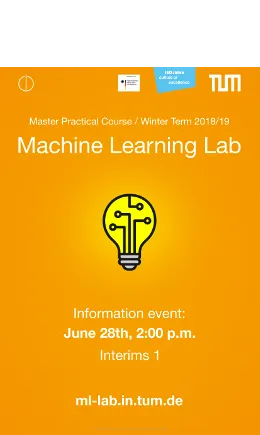Machine Learning Lab
Practical course: Large-Scale Machine Learning (IN2106, IN4192)
Application and resources
The pre-meeting presentation slides from June 28, 2018 are available for download here.
Overview
Machine learning has become one of the most popular fields in research and industry in recent years. Therefore, hands-on machine learning skills are much sought after. In this practical course, students will work in small groups to solve problems on real-world data with state-of-the-art algorithms. Students will be provided with cutting-edge GPU computing resources to facilitate their work on large-scale datasets. We plan to cooperate with industry partners for data and projects. In addition, students are welcome to propose own project ideas by sending in a brief exposé during the application phase.
The objective of this lab course (Master-Praktikum) is to develop data mining/machine learning algorithms specifically handling large real-world datasets. Besides focusing on existing principles, the participants will also design and realize novel analysis techniques.
All organizational aspects will be addressed at the organizational meeting (see below). There will be an online application form soon for interested students to enter relevant information about themselves, which will be used for the admission process.
Information
- First organizational meeting (Vorbesprechung): June 28th, 2018, 2:00pm, Interims lecture hall 1 (Interims 1). All students who are interested in the lab course should stop by.
- Weekly meetings during the semester: Mondays, 2pm-4pm, room 02.11.018
- Prerequisites:
- The lab course is designed for Master students of Computer Science (including Data Engineering & Analytics program etc.)
- Good knowledge in data mining/machine learning is a must (i.e. at least one of the related lectures "Mining Massive Datasets", "Machine Learning" etc.).
- Since the lab course focuses on the implementation of data mining/machine learning algorithms, strong programming skills (in Python, C++, or Java) are required. In particular, knowledge in frameworks such as Theano, Tensorflow, MxNet, PyTorch will be helpful.
